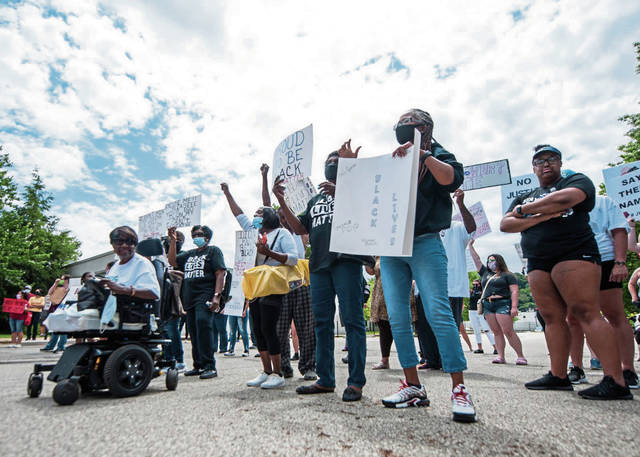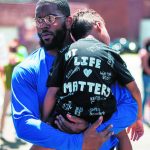One man was Black, the other was white.
One gasped for air as the other man, a uniformed police officer, kneeled down on his neck for nearly nine minutes.
The deadly Memorial Day weekend encounter between George Floyd, a Black man, and white Minneapolis police Officer Derek Chauvin became the year’s second viral event behind the coronavirus pandemic. Footage captured on cellphone and surveillance cameras quickly spread on social media and set the stage — or ignited a match — for a summer of unrest across the country as Americans of all races, ages and creeds took to the streets to rail against racial injustice and police violence.
Demonstrations touched cities of all sizes, including locally in Pittsburgh, Greensburg, Irwin, Jeannette, New Kensington, Monroeville and Murrysville, among others. Demonstrations continued into August and September.
Some protests, including in Pittsburgh, ended in violence and destruction. People, including journalists, got hurt. Businesses were damaged.
And though violence in Western Pennsylvania and elsewhere was largely criticized by local leaders, the message of thousands of demonstrators remains: End racism. Now.
As the year wraps, Black voices in Pittsburgh and the region know they have the world’s ears.
Now what?
Rashad Byrdsong, who founded a youth program named Community Empowerment Association in Homewood in the 1990s, said this year’s protesting led to a willingness to talk about hard things. But now it’s time to plan and strategize, he said.
“We need people from the public and private sectors to come be with the community,” he said. “To sit down and come up with a plan. Not just a feel-good conversation. I’ve been at a lot of those. Now is the time to invest those dollars into areas that disrupt the family function. Then we can say ‘Black Lives Matter.’ Otherwise, it’s just rhetoric.”
Byrdsong and his wife, Amargie Davis, work to give kids in the community opportunities that get them off the streets, whether it be through sports, after-school educational programming and other events.
The couple lost a grandson recently to gun violence. Jafar Brooks, 15, was gunned down Dec. 15 in Penn Hills. Police have not made an arrest, though they have said they believe the shooting was targeted and not random.
Byrdsong said he and Davis did “everything by the book” when raising Brooks, but his death shows gun violence is pervasive and can touch any family. It’s why he said he will continue to push for more investment in underrepresented neighborhoods.
Needed: Money
“There’s got to be investment — from the government, academia, philosophic community,” Byrdsong said. “Money. It takes investment in education, housing, concentrated poverty, workforce development, childhood development. We have to invest in those areas if we’re really going to see change in this country.”
In agreement is Lenny McAllister, a Black Republican who has served as a media commentator, among other roles. He said 2020 made clear racial problems that still exist in society. Americans, however, should move into a new stage in the new year and under a new White House administration.
“It has to go from protest to policies to progress. If you don’t see the second half of the equation, you just see a lot of damage,” the Penn Hills resident said.
McAllister serves as the CEO of the PA Coalition of Public Charter Schools. Before that, he served as adjunct professor of African American history at La Roche University. He said history should serve as a lesson moving forward.
“After 1968 in America, people lost confidence in government. We were hit with hard economic times, and we still had difficulty with segregation in schools,” he said. “There was an oil embargo, the resignation of a president. … Can we really afford that in 2020?”
Needed: Cooperation
Like Byrdsong, he recognizes the need for leaders everywhere to come together in a smart, courageous way.
“That means that people are going to have to start working with people outside the normal confines of who they work with,” McAllister said. “That’s going to be necessary.”
For meaningful police reform, people with law enforcement backgrounds are going to have to team up with people working in urban America, he said. To turn around systemic racism in the economy, the fiscal managers and policy leaders will need to put policies in place that don’t ignore realities felt by traditionally disadvantaged folks, he said.
“If you don’t have smart policies and dedicated people willing to put progress in motion, you have nothing,” McAllister said.
Needed: New ideas
Some new ideas have surfaced.
In Pittsburgh, a task force was created shortly after protests in the city erupted. After several discussions surrounding police use of force and other ideas about how the department can be improved, the city enacted reforms that include a ban on chokeholds, a ban on purchasing surplus military equipment by police and the creation of a Stop the Violence Fund, which uses money in the police budget for social services.
The city also established a new Office of Community Health and Safety to enlist social service experts to help people experiencing homelessness and mental issues, among other issues, formerly handled by police.
Nationally, a police reform bill called the George Floyd Justice in Policing Act that passed the Democratic-controlled U.S. House in June. However, it stalled in the Republican-controlled Senate, and President Trump said he would veto the bill if it came to his desk.
Needed: Grassroots push
Aaron Moore, 49, of Arnold said it’s time for people of color to become involved politically in small towns such as New Kensington, Arnold and Lower Burrell. Moore, who serves on Arnold’s redevelopment authority, organized a Black Lives Matter protest in June in New Kensington.
“There has never been a person of color in leadership in those communities,” he said of New Kensington, Arnold and Lower Burrell. “That needs to change. But that responsibility lies on the community.”
Although seats for public office are up for election as early as next year in New Kensington and Arnold, Moore said getting involved doesn’t have to mean running for office. Attending council meetings, joining committees and boards are all ways someone can get involved and keep conversations going.
The energy that galvanized hundreds of thousands of Americans — many of them white — to protest on the streets has died down. In June, 54% of Americans said they supported the protests, but that dropped to 39% by September, according to Associated Press-NORC Center for Public Affairs Research polling.
“The one thing I don’t want is for people to get complacent,” Moore said. “The trend is now we’re talking about Black lives. We should be talking about poor lives, Black, white or other. Especially with the condition the country is in with the pandemic — we’re all suffering. … I think people need to stay aware and become aware that we’re in this together.”
He said rallies, protests and vigils are important and should keep happening — especially in smaller towns. He also encouraged white allies to “continue fighting along with us.”
“Urban or suburban or whatever, we all have the same type of issues,” Moore said. “Locally, we gotta keep the movement going. If we become complacent, nothing changes. … We have a voice. Keep the conversation going.
“Hate is a learned behavior. It can be unlearned.”
What’s next
With winter here, outdoor protests and rallies have nearly stopped.
Just because they aren’t in the streets doesn’t mean the work stops, said Tanisha Long, who has been working to start a Black Lives Matter chapter in the Pittsburgh region. She founded a Facebook group — Black Lives Matter Pittsburgh and SW Pa — in June. It has about 8,000 members.
The group’s focus through the winter and early part of 2021 will be on prison and education reform within the Allegheny County Jail and Pittsburgh Public Schools.
She hopes to join local efforts to end solitary confinement within the Uptown jail.
The group also is hosting toy drives and other events where organizers will ask for petition signatures seeking support for Breonna’s Law, which would require police to knock and announce themselves when serving a warrant. The law is named after Breonna Taylor, a 26-year-old Black woman who died after being shot in her Louisville, Ky., apartment in March by officers who forced entry as part of a drug investigation.
On the education front, she hopes to launch a nonprofit that takes aim at illiteracy among Black and other minority students.
Looking back on 2020 reminds Long of restless nights and hoarse throats after long rallies. But she will take one major lesson with her into the new year and beyond: just keep on keeping on.
“Sustainability is something on my mind a lot right now. Now that we’ve been given this massive stage, how are we going to use it for the greater good?” she said. “You know, the goal is to not have another George Floyd, but until we fix systemic issues, it’s unfortunately inevitable. So I want to make sure we’re doing things to maintain a community presence, that we keep doing good.
“That’s the biggest thing — being a force for good. And we’ll keep finding ways to do that.”













